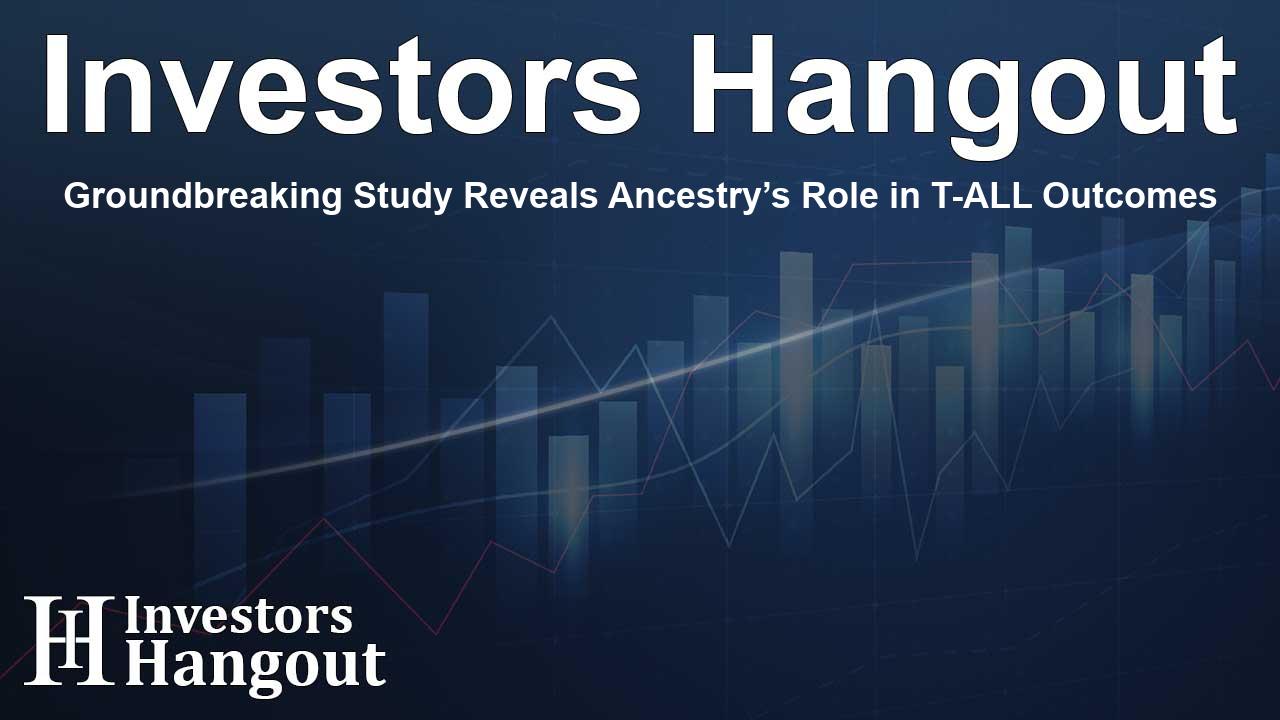Groundbreaking Study Reveals Ancestry’s Role in T-ALL Outcomes

New Insights Into Genetic Ancestry and Cancer Prognosis
This study, from notable researchers at Children’s Hospital of Philadelphia and St. Jude, delves into how genetic ancestry can affect the impact of gene mutations on cancer outcomes in patients battling T-cell acute lymphoblastic leukemia (T-ALL). This groundbreaking research is vital as it represents the first effort to investigate the influence of genetic ancestry on tumor genomics in T-ALL.
Understanding the Research Findings
Published in the esteemed journal Blood Cancer Discovery, this collaborative study reveals that specific gene mutations in T-ALL behave differently based on a patient’s genetic background. As childhood cancer treatment continually evolves, understanding these disparities in treatment response becomes increasingly important for personalized medicine, especially in pediatric oncology.
In the United States, children diagnosed with cancer often receive treatment through clinical trials, which have shown significant success through established regimens informed by past studies. These clinical trials increasingly utilize prognostic biomarkers that indicate whether patients have a high risk or low risk of their disease. However, this new research underscores that not all genetic factors function uniformly across various ancestry backgrounds, highlighting the necessity for equitable healthcare practices.
The Implications of Genetic Variation
Lead author Dr. David T. Teachey emphasized that the findings caution against the potential misclassification of patients’ risk categories. If genomic biomarkers are not equitably applied during treatment decision-making, disparities may deepen. This is particularly concerning for populations that are not of European descent, where variations in treatment outcomes could lead to significant differences in the risks of relapse or adverse effects due to inappropriate treatment protocols.
The research team evaluated data from a multicenter randomized clinical trial, studying a comprehensive sequencing data set of T-ALL patients. Out of the 1,309 individuals analyzed, a striking 80% displayed mutations in genes where their prognostic significance fluctuated with genetic ancestry. For instance, mutations in the NOTCH1 gene correlated with improved survival for European ancestry patients but did not show the same benefit for those of African ancestry.
The Role of Collaboration
This study highlights the collaboration of experts dedicated to cancer treatment and genomic research, showcasing the work of various institutions, including Dana Farber Cancer Institute and the Children’s Oncology Group. Each step in the research process illustrates how previously underexplored factors, such as genetic ancestry, can profoundly influence cancer biology and treatment responses.
Looking Ahead: Future Research Directions
The researchers advocated for extending these findings to other types of cancer, noting that understanding genetic ancestry's role in disease can yield insights that improve outcomes for diverse populations. Co-author Dr. Jun J. Yang expressed enthusiasm for ongoing research with the Children’s Oncology Group, aiming to further uncover the genetic basis of racial and ethnic differences in pediatric leukemia.
The research behind this study is supported by multiple institutions and foundations that prioritize the advancement of childhood cancer research. The contributions from these organizations emphasize a collective commitment to enhance the understanding and treatment of pediatric diseases.
About Children's Hospital of Philadelphia
Children's Hospital of Philadelphia (CHOP) has a long-standing reputation as a premier institution in pediatric healthcare and research. As the nation’s first pediatric hospital, CHOP has played a pivotal role in advancing patient care and pioneering significant research initiatives that have positively impacted children worldwide.
About St. Jude Children's Research Hospital
St. Jude Children's Research Hospital stands at the forefront of children's cancer treatment and research. Being the sole National Cancer Institute-designated Comprehensive Cancer Center focused uniquely on children, St. Jude has successfully increased childhood cancer survival rates over the years and remains dedicated to sharing its research breakthroughs globally to improve care standards.
Frequently Asked Questions
What did the study reveal about genetic ancestry and T-ALL?
The study found that genetic ancestry influences how gene mutations affect the prognosis of T-cell acute lymphoblastic leukemia differently among patients.
Why is understanding genetic ancestry important?
Understanding genetic ancestry is crucial to ensure equitable treatment responses and avoid disparities in care among different populations, especially in pediatric leukemia cases.
How many participants were involved in the research?
1,309 patients were included in the analysis, with a significant percentage exhibiting mutations with varying prognostic outcomes based on their ancestry.
What was the role of collaboration in this research?
Collaboration among institutions like CHOP, St. Jude, and others facilitated comprehensive insights into the genetic factors affecting T-ALL and allowed for a multidisciplinary approach.
What are future directions for this research?
Future research aims to explore the impact of genetic ancestry on other cancer types to improve patient outcomes across all demographics.
About The Author
Contact Owen Jenkins privately here. Or send an email with ATTN: Owen Jenkins as the subject to contact@investorshangout.com.
About Investors Hangout
Investors Hangout is a leading online stock forum for financial discussion and learning, offering a wide range of free tools and resources. It draws in traders of all levels, who exchange market knowledge, investigate trading tactics, and keep an eye on industry developments in real time. Featuring financial articles, stock message boards, quotes, charts, company profiles, and live news updates. Through cooperative learning and a wealth of informational resources, it helps users from novices creating their first portfolios to experts honing their techniques. Join Investors Hangout today: https://investorshangout.com/
The content of this article is based on factual, publicly available information and does not represent legal, financial, or investment advice. Investors Hangout does not offer financial advice, and the author is not a licensed financial advisor. Consult a qualified advisor before making any financial or investment decisions based on this article. This article should not be considered advice to purchase, sell, or hold any securities or other investments. If any of the material provided here is inaccurate, please contact us for corrections.
